June 30, 2023, by Sarah Colborne
Advocates for animal welfare: The Three Rs
Debate has long raged about the use of animals by humans, both as food and for the advancement of science. The National Anti-Vivisection Society was founded back in 1875 and the British Union for the Abolition of Vivisection in 1898, by Frances Power Cobbe, campaigner for women’s suffrage and anti-vivisection activist.
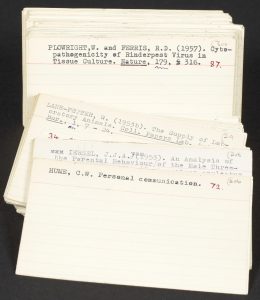
Index cards containing details of sources compiled by William Russell for his research with Rex Burch. WCR/1/2/44/1
The Cruelty to Animals Act of 1876 included provision for licensed scientists to perform approved research using animals. The ever-increasing number of animals used in experiments by the 1950s, prompted the Universities Federation of Animal Welfare (UFAW) to commission young zoologist, William (Bill) Russell, and his assistant Rex Burch, to conduct a study of the ethical aspects of laboratory techniques. Their research took the form of a literature review conducted by Russell and a survey of scientists using animals in their research, conducted by Burch, who travelled round the country recording interviews.
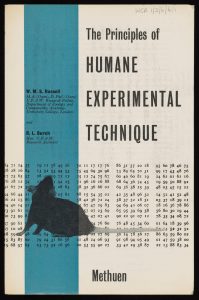
Work carried out by William Russell and Rex Burch, funded by the Universities Federation for Animal Welfare (UFAW), was written up by Russell and published by Methuen in 1959. WCR 1/2/6/6
Their work led to the publication in 1959 of The principles of humane experimental technique, an influential book which elaborated the Three Rs concept as a way in which the inhumanity directly or indirectly involved in performing potentially painful experiments on non-human vertebrates, could be diminished or eliminated through the principles of reduction, replacement and refinement:
- Replacement – the use of non-animal subjects wherever possible, with research into the development and validation of alternative research and testing models;
- Reduction – the minimising of the number of animals used, through better research design, the sharing of information through the creation of databases or through employing statistical methods;
- Refinement – improvement of experimental procedures, ethical sourcing and improved housing to minimise suffering
The Principles made a big impact on Emeritus Professor of Medical Cell Biology at University of Nottingham, Michael Balls, whose research at that time involved developing alternatives to animal tests, particularly in the field of toxicology. Professor Balls started to become interested in how The Principles came to be written and sought out Russell and Burch. Burch was living in Sheringham, Norfolk, and Russell was in Reading and had gone on to focus on other subjects, including psychoanalysis. The pair had lost touch until Martin Stephens of the Humane Society of the United States contacted them to ask for permission to use their names for the proposed Russell and Burch Award (for contributions to animal welfare and the Three Rs). Professor Balls invited Russell and Burch to collaborate on a prefatory note for a special volume of ATLA, FRAME’s journal – the first piece they had worked on together since 1959.
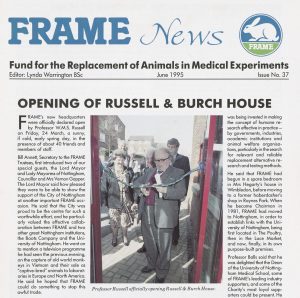
Article from the front cover of FRAME News no. 37. The new headquarters of the Fund for the Replacement of Animals in Medical Experiments (FRAME) was named in honour of the authors of ‘The principles of humane experimental technique’ and was officially opened by William Russell himself. MS 1016/3/5/37
Throughout his professional career, in his role as Chairman of the Trustees of the Fund for the Replacement of Animals in Medical Experiments (FRAME) and as head of the European Centre for the Validation of Alternate Methods (ECVAM), Professor Balls took every opportunity to promote Russell and Burch’s work. For example, he named FRAME’s Nottingham headquarters Russell and Burch House.
Professor Balls arranged an ECVAM Workshop in 1995, ‘The Three R’s: The Way Forward’, which was held in Sheringham due to Burch’s ill health. Burch sadly died shortly afterwards in 1996. Russell, a long-term competitor on BBC Radio Four’s Round Britain Quiz, was well known for performing specially composed songs at conferences on the subject of the Three Rs and he did not disappoint at the Sheringham Workshop. Recordings of a number of these performances have been digitised as part of this project. A snippet of one of these can be heard here.
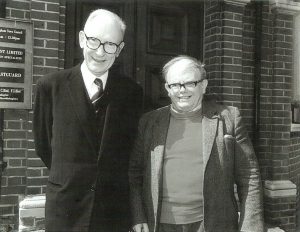
Rex Burch and William Russell at Sheringham Town Hall for the Sheringham Workshop, 31 May 1995. PMB/7/1/O94
After Russell’s death in 2006, Professor Balls worked with Russell’s literary executor to transfer Russell’s vast archive to Manuscripts and Special Collections. The establishment of the archive was celebrated in a 2009 conference at the University of Nottingham, arranged by Professor Balls: ‘Animal Experimentation and The Three Rs: Past, Present and Future’. The event also celebrated the 50th Anniversary of the publication of ‘The Principles’, the 40th Anniversary of the establishment of FRAME and the 30 years of collaboration between FRAME and the University of Nottingham.
Descriptions of the animal welfare collections held by Manuscripts and Special Collections can be explored via the Manuscripts Online Catalogue:
- Papers of Professor William Moy Stratten Russell (1925-2006) relating to the Three Rs principles for the more ethical use of animals in scientific research, (WCR/1 and WCR/6/1)
- Papers of Professor Michael Balls (b.1938), Chairman of the Trustees of the Fund for the Replacement of Animals in Medical Experiments (FRAME), (MS 1016)
- Papers of Professor Michael Balls (b.1938), scientist and Professor of Medical Cell Biology at University of Nottingham, 1960-2021, (PMB)
- Artificial collection of materials relating to Professor William M.S. Russell (1925-2006), (MS 1045)
The papers themselves can be accessed in the Reading Room at King’s Meadow Campus and digital gallery of images from the collections can be found on the Manuscripts and Special Collections website. Visit the website for the Fund for the Replacement of Animals in Medical Experiments to find out more about FRAME’s latest work.
No comments yet, fill out a comment to be the first

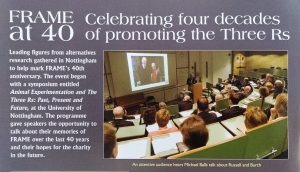
Leave a Reply